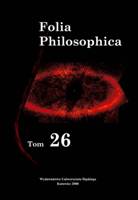
Tragiczna świadomość czy odwieczny problem istnienia? Krytyka Wolfganga Welscha ontologii „sztucznych rajów”
The article raises the issue of existence in the context of the ontology of an electronic media proposed by Wolfgang Welsch. Welsch makes a diagnosis concerning a contemporary change of the paradigm of understanding the world according to which a transition from a logocentric to an aisthetic way of thinking is the effect of the appearance of electronic media. At the same time, aesthetics widely understood as a general theory of experiences, becomes the first philosophy. Deriving from a generalization of experiences of a constructive nature of media realities, the author of “artificial paradises” notices a familiarization of the conviction that each reality, also the non-electronic reality of an every-day life, being a kind of creation, is to some extent artificial. The consequence of the paradigm change is also the lack of correspondence of the category of a traditional ontology to a description of the virtual reality. The article shows that this nonorrespondence results from Welsch’s analogical application of the notions of the nature and phenomenon to digital realities rather than the actual uselessness of these traditional categories. Therefore, the sense of alienation in the worlds of artificial constructions, this “tragic” awareness, being the starting point for Welsch’s considerations, turns out to be the sense of the non-obviousness of being for the first known philosophers.
More...